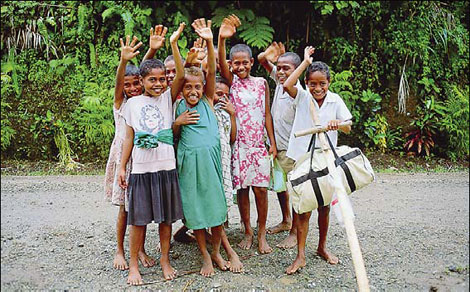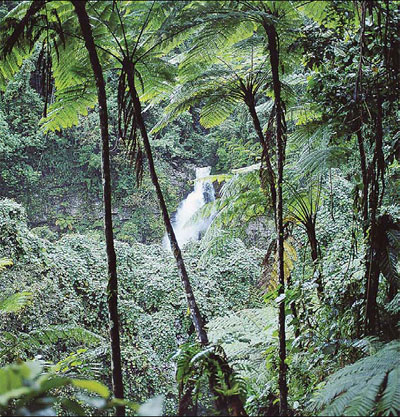|

Rising sea levels threaten both current and future generations of Pacific Islanders.
|
She finds it hard to hold back the tears when she talks about her island home and that of neighboring islands.
"We've got countries here (in the pavilion) that are affected: Tuvalu, Nauru, Kiribati and part of Marshall Islands," she said. "Those areas in Tuvalu you go to, it's only two feet above the sea level. So when you have a spring tide, it just goes right over the island.
"It is not only our concern that low-lying islands might disappear someday, but also a global one. It's the industrial nations that are making this (global warming) happen," she said. "I just wish that the global community could be more aware of it and focus on what to do to help those who're living on these low-lying islands."
|

Rainforests are a big tourist drawcard, but deforestation is another problem faced by Pacific Island nations.
|
While touring the Pacific Pavilion, Shahmeer Esmail from Canada suggested that it should try and make people aware of the problem. "If it's a big concern, they should highlight it somewhere in the pavilion," he said. "It doesn't have to be a big exhibit, but it should be mentioned somewhere.
"The Pacific Islands are as beautiful as paintings, but I'm not sure if they are even going to be here in 20 years. I think it's such a pity for all if we lose them," said Esmail.
Bitterly disappointed by international forums on global climate change, such as the one held in Copenhagen in December 2009, Ganilau suggested the next summit be held in one of the Pacific Islands already suffering the effects. "Have your meeting in one of our low-lying islands, then something might get done about it, instead of just talk.
"They should meet there, then they will know what it is like to lose your country and have nowhere to run."
Pollution is another urgent problem being faced by those living in the Pacific.
Degradation of the environment is not only being caused by global warming. Deforestation and problems with waste disposal are also affecting the Pacific Islands. And this also has an impact on tourism.
"Tourists come here because of the beautiful environment," said Ganilau. "Our coral, our rainforests, our rivers and streams; we not only want to keep these for the tourists, but also for our children."
Fiji furniture company Pacific Green has been contributing to the preservation of the island's natural environment for more than 20 years by using substitutes for rainforest hardwoods.
"In the South Pacific, we found vast abandoned plantations of coconut palm trees," said Dominic Ryan from Pacific Green. "These trees were planted in the early 1900s, but no longer have a commercial use. We tested the wood from the trees and discovered that it is extremely strong and durable. In fact, it is as hard as traditional hardwood and flexible enough to withstand cyclones."
"We concluded that palm trees would be the perfect ecological substitute and the forests would no longer need to be destroyed," he said.
Pacific Green was invited to exhibit at Expo 2010 Shanghai because of the way it mixes sustainable manufacturing with environmental concerns.
Pacific Islands, meanwhile, are trying to find a balance between tourism - a big foreign exchange earner - and sustainable use of the environment.
"We've set aside areas where we can develop for tourism and other areas that we leave untouched. Most governments in the Pacific are doing this and I think it's very good," said Ganilau, who is also the founder of Fiji's Green Party.
Kotimere Oromita who works in Pacific Pavilion's Kiribati Pavilion said her island's tourist slogan is "For Travelers, Not Tourists." She explains: "We want those who come to our island to experience what we have and accept what we can offer, like fishing and diving."

